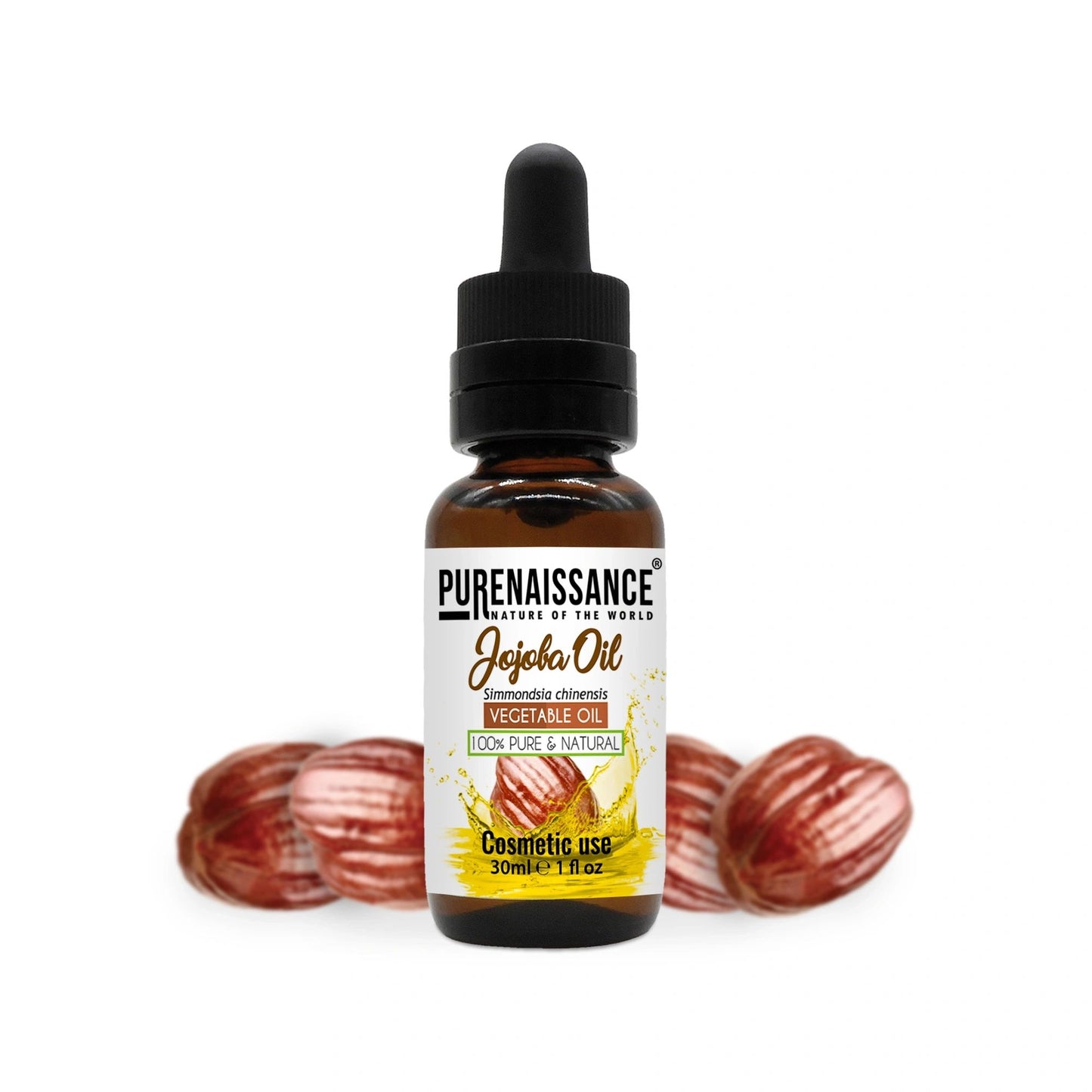Purenaissance
Jojoba Vegetal Oil/30ml
Jojoba Vegetal Oil/30ml
Couldn't load pickup availability
What is Jojoba Vegetable Oil?
Jojoba oil is a pale yellow liquid with a waxy consistency. It is obtained from the seeds of the Simmondsia chinensis, a tree that grows in California, southern Arizona, and northwest Mexico. It belongs to the Simmondsiaceae family.
Jojoba oil stands out from all other vegetable oils due to its unique chemical composition. It is a liquid wax, composed primarily of long-chain fatty acid esters and fatty alcohols. These characteristics make the oil resistant to oxidation and rancidity.
In cosmetics, jojoba oil is renowned for its ease of absorption, thanks to its remarkable compatibility with sebum produced by the skin. It is particularly useful for restoring the skin's lipid barrier, which is often compromised in dry or hypolipidic skin. Jojoba oil also provides effective moisturization, especially when applied to damp skin or rubbed between wet hands.
It is widely used in makeup, skincare, and haircare products. Jojoba oil can also be used as a massage oil, either on its own or blended with other oils, and as a base oil for essential oils. It is a safe ingredient that can be applied to the skin in any concentration.
Jojoba Vegetable Oil Technical Data
- Common Name: Jojoba
- Botanical Name: Simmondsia chinensis
- Appearance: Liquid wax
- Color: Yellow
- Odor: Slightly nutty
- Botanical Family: Simmondsiaceae
- Organ: Seeds
- Processing Method: Cold pressing
- Type: 100% pure
- Origin: USA
- Preferred Uses: Cutaneous route, internal route
Chemical Composition:
Jojoba oil contains the following fatty acids:
- Oleic acid
- Ferulic acid
- 11-eicosenoic acid
- Palmitoleic acid
- Erucic acid
- 9-gondoic acid
- Docosenoic acid
- Docosadienoic acid
Additionally, it is rich in skin-nourishing nutrients such as:
- Zinc
- Chromium
- Vitamin E
- Iodine
- Selenium
- Silicon
- B-complex vitamins
- Copper
Storage Conditions:
- Avoid heat, flames, or sparks.
- Store away from direct sunlight.
- Keep in tightly sealed containers below 40ºC in well-ventilated areas.
- Do not use pressure to empty the container.
Physical Properties of Jojoba Oil
- Freezing Point: 7–10.6°C
- Refractive Index: 1.4650 at 25°C
- Specific Gravity: 0.863 at 25°C
- Smoke Point: 195°C
- Flash Point: 295°C
- Iodine Number: 82
- Viscosity: 48 SUS at 99°C, 127 SUS at 37.8°C
Properties of Jojoba Vegetable Oil
Cosmetic Properties (for cutaneous use):
- Seboregulating (adjusts sebum production)
- Regulates the skin’s pH
- Protective and nourishing
- Anti-desiccant (stimulates collagen production)
- Healing and regenerating
- Fortifies the scalp and hair
- Emollient
Other Properties:
- Photoprotective
- Anti-inflammatory
- Anti-infectious for the skin
Indications for Jojoba Vegetable Oil
- Acne and acne pimples
- Minor injuries (scarring)
- Oily, dry, or brittle hair
- Dull, tired hair
- Hair loss
- Light scars
- Cracks in the skin
- Greasy or dry scalp
- Cleansing and drying (hands, body, hair, nails)
- Chapped skin
- Skin infections
- Protection from bad weather (wind, cold, etc.)
- Massage oil
- Flabby or mature skin
- Dry, oily, or mixed skin
- Sensitive skin
- Post-shaving or hair removal care
- Wrinkle prevention
- Excess sebum control
- Light sunscreen
- Prevention of skin aging
Practical Tips
- Jojoba wax combines perfectly with essential oils that have dermatological benefits. For example, it can be paired with Geranium Bourbon or Ylang Ylang essential oils for day or night creams.
- Body Oil: Jojoba is less messy compared to other plant-based oils.
- Anti-Aging: Daily use can reduce wrinkles by up to 30% due to its linoleic acid content, which supports skin cell regeneration. Its effects are enhanced when combined with moisturizing creams or face washes.
- Shaving: Can be used as both a shaving oil and aftershave moisturizer.
- Lip Conditioner: A drop applied to lips morning and evening reduces flakes and plumps vertical lines.
- Cuticle Protection: Regular use helps keep cuticles moisturized and healthy. Soaking nails in warm water mixed with jojoba oil once a week for 10–15 minutes is recommended.
Precautions
- Topical Use: Jojoba is generally safe for most people. However, it may cause mild side effects, such as rashes or allergic reactions.
- Oral Use: Jojoba is unsafe for ingestion due to the presence of erucic acid, which can cause serious side effects like heart damage.
- Pregnancy and Breastfeeding: Jojoba is safe when applied to the skin but unsafe for oral consumption.
First Aid Measures
- Inhalation: Not applicable at normal temperatures.
- Eye Contact: Rinse thoroughly with water.
- Skin Contact: Wash with soap and water; not irritating.
- Ingestion: Not considered dangerous but may have a laxative effect if consumed in large quantities.
Share


